
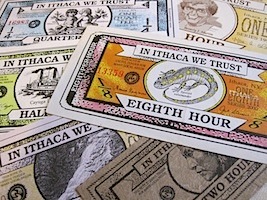
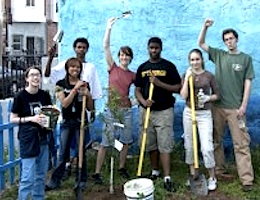

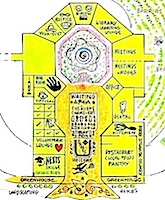


 |
 |
 |
 |
 |
  |
| PAUL
GLOVER ESSAYS: community
control of food, fuel, housing, health care,
planning, education, finance. |
| HOME | INTRO | CURRENCY | SUCCESSES | HOW-TO BOOK | PUBLICITY | ESSAYS |
|
Philadelphia's
Poverty Industry Paul Glover * June
2016
originally published by The Good Economist Poverty is one of
Philadelphia's major industries. Tens of thousands of jobs-- public and
private-- depend on managing poverty. The poor, 400,000 here, are raw
material to control (evaluate, certify, monitor, police), punish
(courts, fines, evictions, prison), and exploit (small pay, big rent,
predatory mortgages, payday loans).
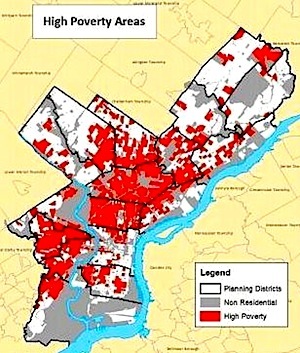 Therefore,
it
is essentially against the law to end poverty in
Philadelphia. The major owners of the city's land and money forbid
profound change that weakens their grip, even though Philadelphia has
the nation's highest rates of deep poverty and incarceration;
plus 200,000 unemployed, 135,000 uninsured, 250,000 "food insecure"
with 60,000 chronically hungry
children; even though life expectancy in North Philly is 20 years less
than in Queen Village. Therefore,
it
is essentially against the law to end poverty in
Philadelphia. The major owners of the city's land and money forbid
profound change that weakens their grip, even though Philadelphia has
the nation's highest rates of deep poverty and incarceration;
plus 200,000 unemployed, 135,000 uninsured, 250,000 "food insecure"
with 60,000 chronically hungry
children; even though life expectancy in North Philly is 20 years less
than in Queen Village.Solutions to poverty are everywhere. Hundreds of neighborhood-based initiatives here could empower the poor to take direct control of their lives, gradually replacing welfare with well-being. But Philadelphia does to the poor everything but provide them the tools (land, home ownership, education, jobs, respect) with which to prove they're the equal of everyone else. For example, Philadelphians could build thousands of low-cost, energy-efficient tiny houses" and "earthships" on vacant lots, for our seniors, veterans, returning citizens, teachers, farmers, students, and homeless on land trusts that keep dwellings permanently affordable. Within them, the poor could become creative owners of green neighborhoods. But building and zoning codes resist such construction. Meanwhile, neighborhood land trusts could
stabilize housing prices and
expand ownership. But the government protects land speculators waiting
to cash in with condos and strip malls.
|
Major media could use their cultural power to inspire trust and
enthusiasm for the future. But corporate
broadcasters spread fear and
dread, instead of uniting us to assume power. City Hall could
convert
the poorest into entrepreneurs by making internet free in humble homes,
but telecommunications corporations
threaten to sue.
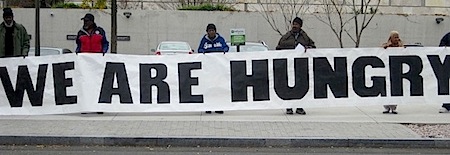 To accelerate change, City Hall could move tax revenue from commercial banks into a new municipal bank with accounts targeted to the solutions above. But megabanks resist competition. At the same time, an independent regional stock exchange could gather capital specifically to empower the poor, but securities law resists this, too. Millions of dollars could be raised to replace poverty with jobs, without raising taxes, were the City to accept small-denomination negotiable bonds backed by the land, tools, and skills of all who want to end hunger, homelessness, and crime. But this requires special effort. Foundations could fund those who challenge power, rather than just accommodate it. Sooner or later, though, the supreme laws of human need will assert balance. For better or worse, one of two things will happen. To survive, the poor would get tired of killing one another and would take what they need from Center City. Eventually there would not be enough police to prevent upheaval. As JFK said, "those who make peaceful revolution impossible will make violent revolution inevitable." This is not a threat, just history. 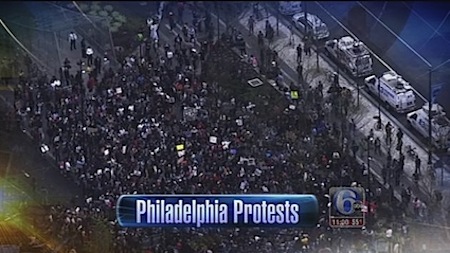 By contrast, City Council could change current laws to prioritize economic justice. This benefits everyone. Philly's middle class will stabilize by joining forces with the traditionally poor, to rebuild society toward balance with nature. This would employ the next ten generations of construction workers, engineers, and the rest of us. Rather than merely servicing and controlling suffering people, we gradually transfer economic power and land to them, and ourselves, through mutual aid systems. By embracing this new idea of success the middle class can, in fact, become something better-- the Mutual Class. They can reduce their own costs of living, and costs of government, by investing in poor neighborhoods directly. While there may always be need for government safety nets, taxpayers would increasingly escape the taxes that currently subsidize housing, heating and electric, Medicaid and Food Stamps. And there will be more taxpayers to share the load. At the same time, the rich and powerful would be freed to use their authority is to serve humanity, not gluttony. Employers would invest in workers as assets (even as friends) rather than as costs. This process requires neither bloodthirsty capitalism nor bleeding-heart socialism. Call it Mutual Enterprise-- the collaboration of mutual aid groups and businesses dedicated to community. To summarize, it is an unusual revolution which benefits liberals and conservatives, which lowers taxes and living costs, expands enterprise, reduces crime, cleans the environment, and ends poverty. Philadelphia will get ahead by getting together. Glover is founder of 18 mutual aid campaigns, author of six books on grassroots economics including Green Jobs Philly, former adjunct professor of urban studies at Temple University. paulglover.org |
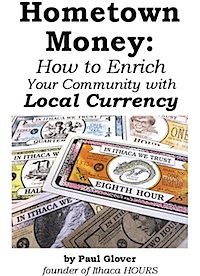 |
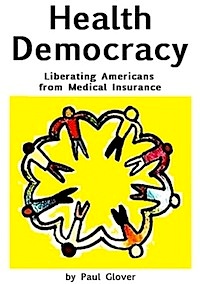 |
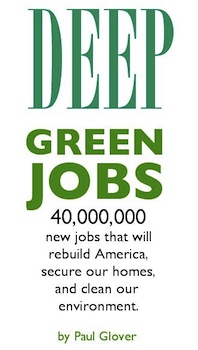 |
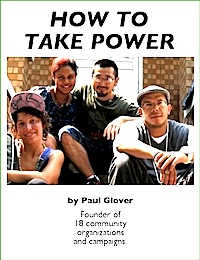 |
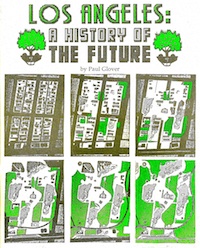 |